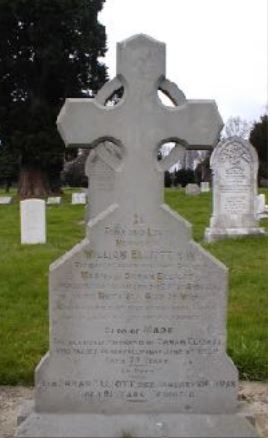Royal Navy – HMS Agincourt

William Elliott was the only son of Mark and Sarah Elliott and was born in Gloucester on 7 September 1878. His father had a sea going connection, as a Coast Guard and later census returns show him located at various coastal stations in southern England.
He joined the Royal Navy as a Boy in 1894 and gradually worked his way up through the ranks. First to Ordinary Seaman on 7 September 1896; Able Seaman on 22 April 1897; Leading Seaman on 17 August 1899; Petty Officer (PO) 2nd Class on 1 April 1900; PO 1st Class on 16 January 1903 and Chief Petty Officer (CPO) 1 February 1914. He served at CPO rank until the time of his death.
He saw service on several ships and shore establishments and at the time of his death was part of the crew of the dreadnought battleship HMS Agincourt. This ship had an interesting history, having originally been destined for the Brazilian Navy; it was eventually purchased by Turkey, only to be requisitioned by the Royal Navy, upon the outbreak of the Great War: a move which part determined that county’s decision to join in with the Central Powers. Agincourt was the most heavily gunned ship in the Grand Fleet, mounting 14 twelve inch guns, all of which could be fired in salvo, as they were on seven occasions at the Battle of Jutland in May 1916.
When he fell ill in April 1918, Elliott was transferred to the Hospital Ship Plassy, which was located at Scapa Flow in the Orkney Islands. He died on board, of acute bronchitis, on 29 April 1918, aged 39. His remains were conveyed from the north of Scotland to Gloucester by rail.
His CWGC Register entry records that he was the recipient of a Long Service and Good Conduct Medal. His Service Record is in the National Archives (ADM188/294).
At the time of his death his parents lived at 49 Dean’s Walk, Gloucester. He was buried in a family plot in Gloucester Old Cemetery, marked by a tall grey stone cross and in 1929 he was joined by his father and in 1938 by his mother. The headstone notes that he died ‘in the North Sea’.
According to the report of his funeral in the Gloucestershire Journal of 11 May 1918 he lost a brother-in-law about eighteen months earlier aboard HMS Flirt. This was sunk during a raid by German torpedo boats and destroyers on the Dover Barrage on the night of 26/27 October 1918.
Researched by Graham Adams 21 April 2014 (revised)
